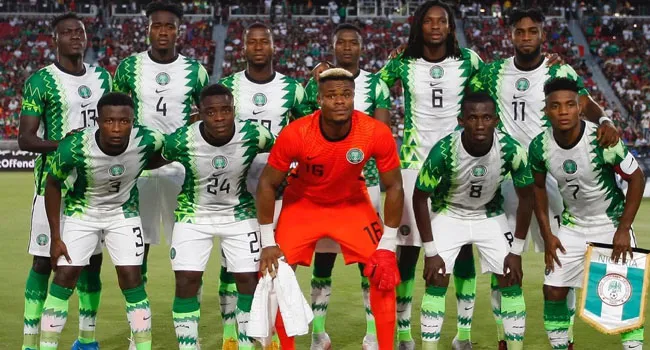What started as a Greek gift for the home-based Super Eagles turned out to be an exhibition of Nigerian football.
A 4-0 nil loss to Mexico by the Super Eagles consisting of largely Nigeria Professional Football League players was seen as a victory,
Victory to justify the inability of Gernot Rohr to blend the players with their foreign pros.
Stripped of all foreign-born Nigerian players; laid bare without the legion of Europe-based players who passed through the unstructured academy system;
The Super Eagles are left with an outgoing Ahmed Musa, bit part Abdullahi Shehu, and a noble slot for goalkeeper all belonging to the NPFL.
From Green Eagles To Super Eagles: A History
When the Super Eagles (formerly Green Eagles), coached by the Brazilian-born Otto Glória, won the country’s first AFCON title in 1980, Godwin Odiye was the only overseas-based player.
The defender was at the time a student at the University of San Francisco, USA).
The silver-winning side at the 1984 AFCON in the Ivory Coast, coached by Adegboye Onigbinde and captained by a young Stephen Keshi, comprised of home-based players.
By 1988, when the Super Eagles secured another second-place finish at the Maroc 88, only five of the players in the squad – Peter Rufai (Lokeren, Belgium), Keshi (Anderlecht, Belgium), Samuel Okwaraji (VfB Stuttgart), Augustine Eguavoen (K.A.A. Gent, Belgium), and Rashidi Yekini (Africa Sports, Ivory Coast) – were playing for foreign clubs.
A Revolt And A Chance For The League
A revolt by the country’s growing army of Europe-based players over bonuses forced Clemens Westerhof to look inward and prosecute the 1990 AFCON in Algeria with a team made up of almost entirely home-based players.
Only Andrew Uwe, Friday Elaho of the Danish side Brondby, and Yekini were the exceptions.
The team won silver at the 1990 AFCON with six of the stars from that squad – Yekini, Daniel Amokachi, Thompson Oliha, Okechukwu Uche, Ben Iroha, and Alloy Agu – going on to make the country’s team to the 1994 FIFA World Cup.
When Westerhof led the Super Eagles to the 1992 AFCON in Senegal, only eight home-based players, featuring the duo of Oliha and Finidi, made it to the tournament.
Out of all the home-based players Westerhof banked on two years earlier in Algeria, six made the Senegal ‘92 squad.
Only Oliha and Abdul Aminu were still plying their trade in Nigeria for Iwuanyanwu Nationale (now Heartland FC) and El-Kanemi, respectively.
At the Tunisia 1994 AFCON, only Isaac Semitoje (Iwuanyanwu Nationale) and Edema Fuludu (BCC Lions) were based in Nigeria.
The duo were unable to break into the final 22-man squad for the 1994 FIFA World Cup.
Westerhof, no longer a fan of a Nigerian league, took a team made up entirely of foreign-based players to the United States, except the duo of Oliha (Africa Sports, Ivory Coast) and Emmanuel Amunike (Zamalek, Egypt), playing in Africa.
Home-based Super Eagles: Keshi Paying It Back
Fast forward 19 years later, when Keshi led the Super Eagles to a third AFCON title, with only six home-based players.
Azubuike Egwuekwe (Warri Wolves), Reuben Gabriel (Kano Pillars), Godfrey Oboabona (Sunshine Stars), Ejike Uzoenyi (Rangers), Sunday Mba (Rangers), and goalkeeper Chigozie Agbim (Rangers) – made the trip to South Africa. Oboabona and Mba were the only ones who got game time.
A year later though, only the quartet of Egwuekwe, Oboabona, Agbim, and Uzoenyi made it to the World Cup. Oboabona after he moved to Turkey.
Since Rohr took charge of the Super Eagles in 2016, only one home-based player, Ikechukwu Ezenwa, has featured regularly in his selection.
Ezenwa would go on to be the only NPFL player in Rohr’s teams to both the 2018 FIFA World Cup in Russia and the 2019 AFCON in Egypt.
